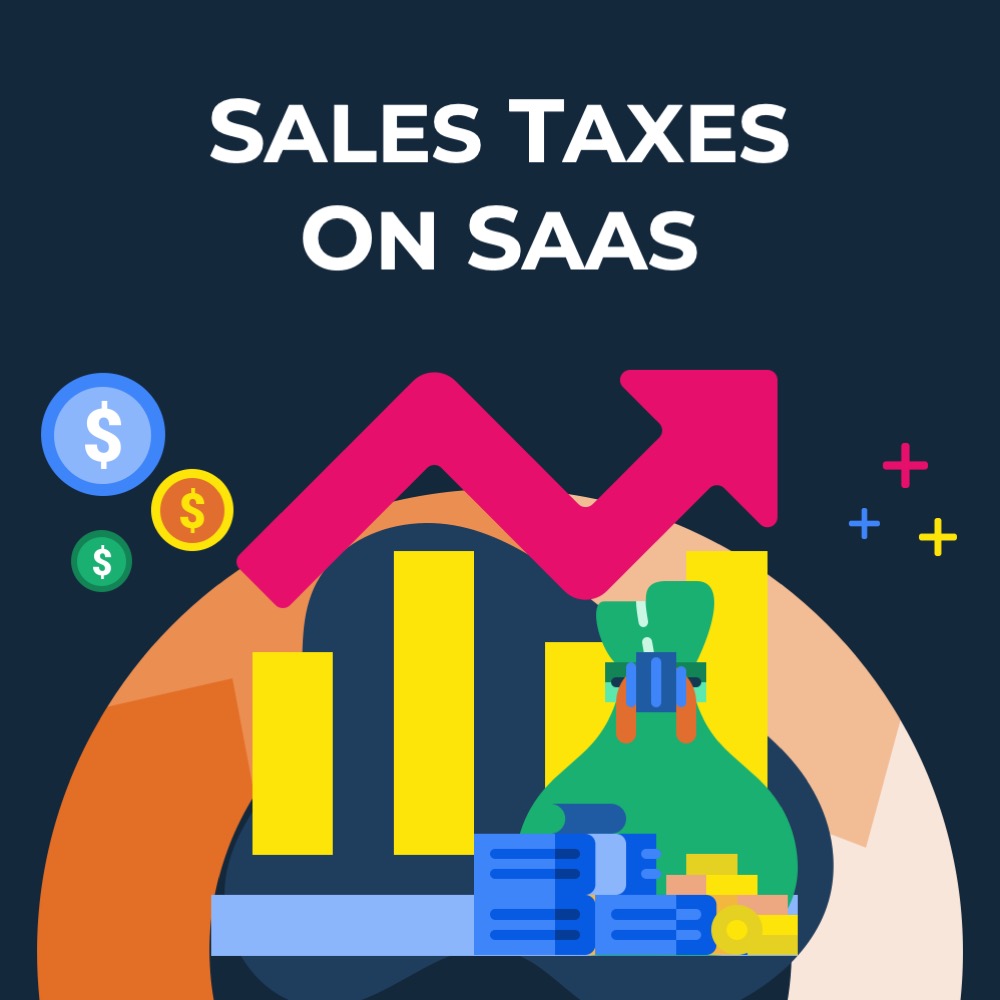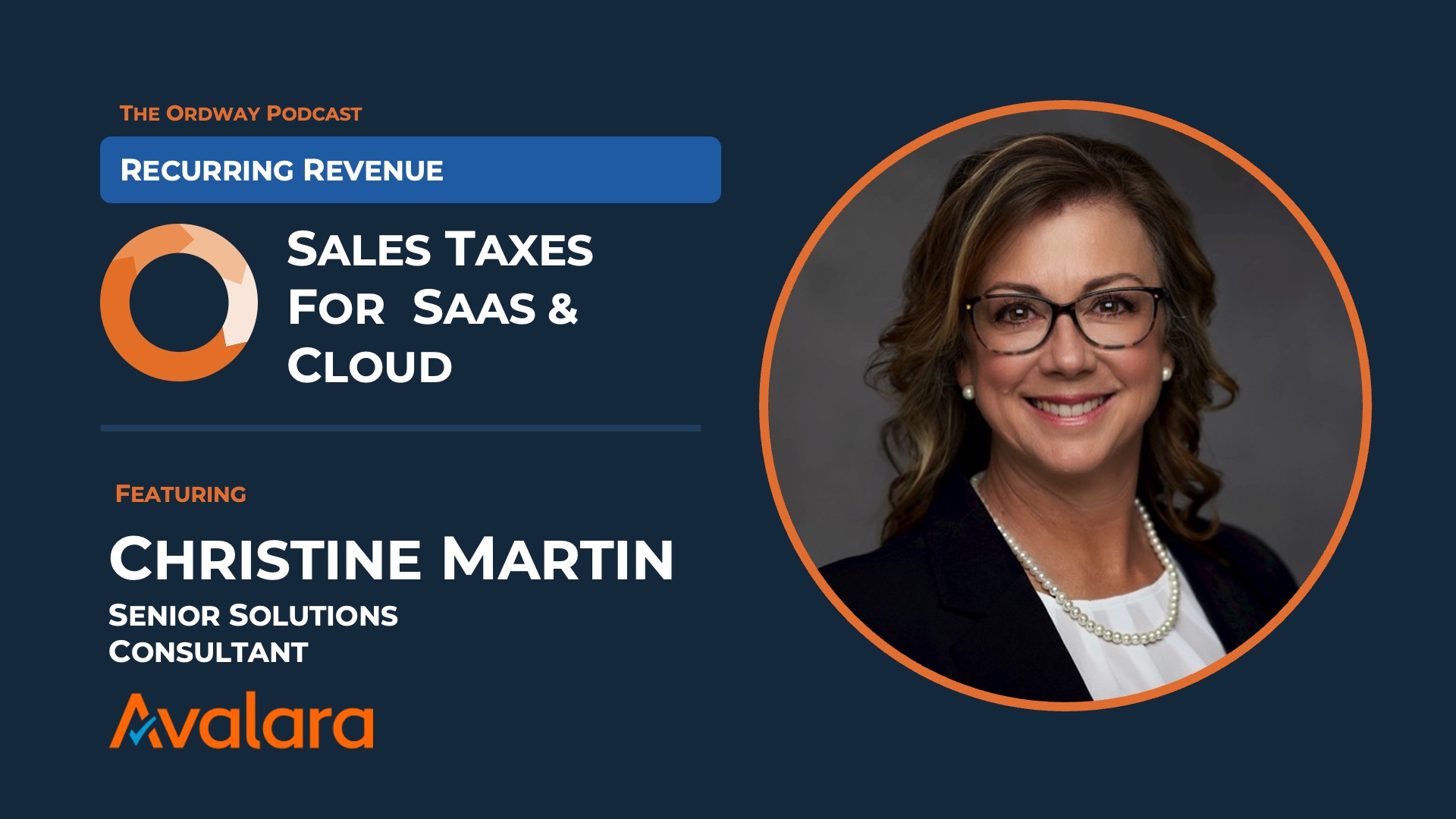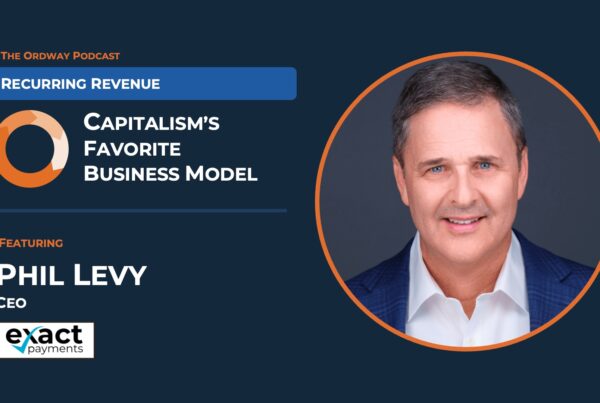
The Ordway Podcast: Capitalism’s Favorite Business Model
Sales Taxes for SaaS Companies
Christine Martin, Senior Sales Consultant at Avalara, explains the challenges that early-stage SaaS companies face in complying with US state and local tax laws. She offers suggestions on how finance teams can assess their current liabilities on historical sales and how they can begin collecting taxes going forward on new invoices.
Episode Summary
In 2018, the Supreme Court overruled the longstanding precedent that companies needed a physical presence in a state or local municipality to be subjected to sales tax. Following the decision, hundreds of states, cities, and other jurisdictions began collecting sales taxes on online purchases made on e-commerce storefronts and marketplaces as well as SaaS and cloud subscriptions. Sales tax laws vary by state. Some states do not charge sales tax. Others have a threshold under which no taxes are due. The thresholds are usually tied to the minimum dollar value of sales, a transaction count, or both. Taxes are collected not just at the state level, but also at the county and city levels. Sales taxes place a significant administrative burden on the finance departments of SaaS companies, which must collect the taxes from customers and submit payments to government agencies. They must also keep detailed records in case the tax authorities request an audit. In this episode, Christine Martin, a tenured tax expert, with Avalara explains the complexities of sales taxes and how SaaS companies can use technology to reduce the cost of collecting, paying, and reporting.
What sales taxes do SaaS companies have to pay in the US?
Steve Keifer: The primary audience that watches this podcast is early stage companies. A lot of them are venture backed, some of them are bootstraped, but they’re primarily in the SaaS, cloud, fintech, AI, DTC, and subscription space. Some of the companies have their arms around sales taxes, but a lot of others do not. Many early-stage companies don’t even necessarily have a finance department. Could you start by giving a general overview of sales taxes and how they apply to SaaS companies?
Christine Martin: Here in the United States, we have this concept of nexus. And it used to be years ago that you had to have a physical presence (to be taxed). For software companies that are selling online, where’s your physical presence? Probably just an office, right? Retail stores was really obvious. If you had a retail store, you had a physical presence. Well, the state of South Dakota sent an assessment out to Wayfair, an online retailer of home goods, right? And said, hey you’ve created a presence for us in your state it may not be physical but we now want you to pay taxes here. That South Dakota versus Wayfair case made it all the way up to the Supreme Court and the Supreme Court said economic nexus is a thing you don’t have to have a physical presence anymore just having this economic presence. Well what’s economic presence? Every state passed a law around economic nexus in their state and it would be absolutely silly if every state was the same. I wouldn’t have had a job for as long as I have. Some states say it’s based on the number of transactions. Others say it’s based on their total income. Others look at a combination of both. And now more and more people are having to become taxpayers. People that obviously had stores, they were becoming taxpayers, but now insert all of these online sales and now I’ve now got to charge tax and understand the taxability in more states. I never had to before because I didn’t have a presence, but now how is clothing taxed in New York and in Washington and Pennsylvania and Texas? That’s an awful lot for people to manage. And that’s really where Avalara comes in because one, how the heck do people know when they’ve reached economic nexus. That’s a lot of analysis of a lot of data every single month. They’re doing other things. They’re not worrying about this economic nexus thing. But then they also have to understand how their products are taxed. Product changes quicker than tax law. Tax law is always pretty old. They’re late to the game on an awful lot of things. So all of these concepts of e-commerce and marketplaces changed a lot quicker than this tax law. So people that are selling software online, how the heck do they know when they’re required to charge tax in another state? That’s not what they do, especially for people that don’t have a finance department like you’re talking about.
How do sales taxes on SaaS differ by city and state tax jurisdictions?
Steve Keifer: Are sales taxes assessed at a state level or do some cities and counties and other jurisdictions get in? maybe for the audience just to help, is there an example maybe of two extremes? Are there some states that don’t charge and others that have relatively high rates or relatively low thresholds for nexus?
Christine Martin: Sure, let’s stick with the software space. So one of your questions was, are there these local taxes? And absolutely there are. So it’s not just, there local taxes, but who administers them and who sets the rules? And my answer for almost everything, and it drives people nuts at our company, is it depends. So the city of Chicago, if you’ve got a customer in the city of Chicago and you’re selling them software as a service, there is a city of Chicago. They have a crazy name for it, a non-titled personal property lease tax. It’s software as a service, but they call it a lease tax. It’s not taxable at the state, but it’s taxable at the city of Chicago. Right? Where you could actually sell that same software subscription to a consumer in California, and California doesn’t tax it. Here’s the crazy thing about sales tax, I think, is the states have created these sales tax rules because it makes up over 30 % of their income, but they’re utilizing businesses to facilitate and be these tax collectors. But then they’ve made it so complicated that if these businesses do it wrong, they get penalized. And it’s kind of a catch-22. Hey, we’re going to ask you to do this for us, but we’re going to make it as complicated as humanly possible, and then we’re going to penalize you when you can’t read the rules.
What are the risks of non-payment of sales taxes on SaaS?
Steve Keifer: What happens if you don’t pay sales taxes on SaaS transactions? Does Johnny Law show up at the door? Does somebody show up with an invoice and demand collection? Are you restricted on your ability to do business in the state or raise capital or anything? What’s the risk? Christine Martin: There are so many risks. I actually spoke to a customer, a prospect, probably about a month ago, where they hadn’t been collecting tax anywhere, and somebody showed up at their door and said, we know you’re doing business in the state, but we don’t have you registered as a taxpayer and they started an audit. And if you never ever file a tax return, the statute of limitations stays open forever. The state of Alabama could have gone back 20 years since the business started. Let’s talk about the funding piece, because this is really prime in the categories of folks that we’re talking about, is these companies that are doing due diligence, private equity firms, venture capital firms, are doing some due diligence, and they’re getting pretty smart about this sales tax stuff. And they may say, you guys aren’t billing sales tax. Why aren’t you? And then maybe as part of this deal, they’re gonna hold back some funds until you take care of it, or they’re just not gonna fund you because you haven’t taken care of this tax liability. And what’s interesting about all of this sales tax piece is if you’ve collected it and you don’t report it, corporate officers are held liable, personally liable. Steve Keifer: I hadn’t thought about that scenario, but if you’re just pocketing it and collecting it. Yeah. And I think the investor aspect is something a lot of folks don’t necessarily think about either, but yeah, the level of diligence that these VC and growth equity and private equity firms are doing these days is mind boggling. I can easily see that becoming an issue. Christine Martin: There was a conversation I had last week with somebody that was supposed to close and they had a whole bunch of tax obligation and the private equity firm said, you got to take care of that before we buy you or before we invest in you. And so they were scrambling. They’re like, how can we get this done in five days? It’s a little hard to do in five days, but they were pushing hard to get it closed. But that firm said, “No, you guys got to take care of this.” We’re not going to jump into this with a whole liability out there.
How can SaaS companies make back payments on sales taxes they have not collected, but owe?
Steve Keifer: If a SaaS company hasn’t been collecting sales taxes, but should have been, do they need to self-fund the back payments? They can’t go back and re-invoice customers, right? Christine Martin: Yeah. Well, they could, they absolutely could. It’s not great customer service though, right? But one of the processes in this voluntary disclosure, every business that’s buying something should be looking at their invoices and saying, hey, this vendor didn’t charge me tax. I know what I’m buying is taxable. And it’s kind of the opposite side of sales tax. It’s called consumer use. So the state doesn’t get it twice. So even if a seller didn’t collect the tax, they can always reach out to their customer and say, hey, I didn’t charge you the tax. Did you report it yourself? So think about if anybody uses a TurboTax – one of the questions that usually pops up, did you buy anything online that you didn’t pay sales tax? Everybody says yes. But that’s this way of the states recouping this tax that a vendor who wasn’t registered sold you something. It’s putting the onus on the consumer, hence consumer use tax. Steve Keifer: Yeah, I hate that question in TurboTax. Christine Martin: We heard this an awful lot and Avalara implemented a consumer use tax solution as well for our customers because this self-evaluation of purchases really becomes problematic. We use Salesforce. Think about how many people at Avalara use Salesforce across the country. Well, I’ve got to allocate that cost of my Salesforce license to multiple places. Salesforce isn’t going to do that when they bill us. We do that internally. So there’s all kinds of remedies on these voluntary disclosures. Hopefully your customers self-paid it, and then you can just give a statement to the state saying, I’m not gonna pay you again. Here’s a signed statement from our customer that they paid it.
How do you get started paying sales taxes on SaaS?
Steve Keifer: If someone hasn’t paid and hasn’t been collecting, how do they get their arms around this problem? How do they know where they may or may not have nexus? How do they just get a ballpark size of what their obligation on sales taxes is? Is there an easy way to get started? Christine Martin: There is. So we offer our customers, we call it a sales tax risk assessment, where you can provide a sales information, the quantity of sales, going back four years. And that’s that first step that we can look at it and say based on all of this information, we think you’ve reached this threshold and you should have become a taxpayer. And then we can also do a calculation to see what that tax liability looks like. And based on all of that assessment, then they’ve got some options. You can do what’s called a voluntary disclosure, which means Avalara or somebody reaches out to these jurisdictions and say, hey, we’ve got somebody that didn’t collect tax and they should have, I’m not going to tell you who they are but if you agree to waive the penalty and limit how far you look back, we’ll get them registered, get them filed, and then we’ll tell you who they are. If it’s a small amount, you can certainly just register and file those back returns. A lot of it really depends on how much tax we’re talking about.
What are exemption certificates for sales taxes on SaaS products?
Steve Keifer: You mentioned exemption certificates a few minutes ago. Can you explain what exemption certificates are and how they apply to sales taxes on SaaS? Christine Martin: So think about if you were to walk into the state of a store in the state of Pennsylvania and buy a pair of jeans, just natively because of tax law, clothing isn’t subject to tax. But if you walk into the state of Georgia, into a store in Georgia and say, hey, I wanna buy these jeans, but I don’t wanna pay tax, you have to give somebody something that says, here’s why you shouldn’t charge me tax. And that’s an exemption certificate. It could be because you’re a diplomat. It could be because you’re reselling it. You’re a nonprofit. But then you have to hold on. That retailer that gets that certificate has to hold on to that certificate for a good four years. And if an auditor comes, yeah, maybe longer, some of these certificates never, ever expire. So when an auditor comes knocking on the door, you gotta go find that needle in a haystack. And what did I do with that one piece of paper from that one transaction four years ago?
Do tariffs have an impact on sales taxes for SaaS companies?
Steve Keifer: We are recording this in the first half of 2025 and certainly the US initiated trade war and all these tariffs that we’ve announced has dominated that business news headlines for the past few months. I know it’s relatively early, but are you seeing any kind of reaction from any of the customers or businesses that you’re working with? Is there anything that they’re doing differently as a result of some of these potential tariffs?
Christine Martin: We’re calling it whiplash because just when you think you got this under control, whoops, nope, that the rate has changed or it’s no longer there and what’s tariffed, what isn’t. I don’t know how people do this manually myself. What we have seen over and over and over again are companies wanting to add a tariff surcharge on their invoice. They may be paying these tariffs, paying higher rates when they import things and they don’t necessarily want to increase their prices, but they want to recover these tariffs that they’re paying on import. They’re adding a line on their invoice for these surcharges. Here’s where we get into some crazy depend situations is where you report that surcharge on an invoice can impact the taxation of it. I kind of think of it above the line and below the line. Above that subtotal line, it’s a separate line item, then it may take on the life of the other items that are being invoiced taxability-wise. If you’re selling something that’s taxable and you’ve got this tariff surcharge, most likely that tariff surcharge is gonna be taxable. But if you put this tariff surcharge below that subtotal line and it’s not related to any one thing, it’s almost always taxable. Companies, as a way of recovering some of these costs so that they’re not taking a hit themselves, are adding these surcharges. I just caution everybody to be very careful about how you put it on an invoice, because it could impact their tax obligations. Steve Keifer: Yeah, so they’re adding these surcharges to try to recover some of the taxes they’re having to pay on the imports and then they’re getting taxed on the surcharge as well. Christine Martin: Well, they’re not getting taxed. They’re passing a, they’re having to tax their consumers as they bill it. But yeah, that’s exactly what they’re doing. I mean, imagine 125 % surcharge that you’re paying when you import it. That really hits your bottom line. So why not recover it? When I was at the telephone company, we had a property tax surcharge and we charged every single one of our customers a property tax surcharge. And our tax department became a profit center. Because the money that we brought in from these property tax surcharges more than covered our property tax expense.
What are some of the emerging issues in sales taxes for online businesses?
Steve Keifer: Is there anything else that I haven’t asked you about? Are there any other changes in tax laws or things that you see kind of happening on the horizon that are worth mentioning?
Christine Martin: There are tax holidays that happen every single year. Maybe some of these softwares fall into a tax holiday. And again, I don’t know how people manage this without automation. So keep in mind that there’s tax holidays that may be applicable. If you’re actually selling goods and they’re recurring goods, there’s these new fees, kind of like a surcharge called retail delivery fees. Colorado was the first one to enact this retail delivery fee. This all stemmed from COVID. If you think about what happened during COVID, people stopped driving. They stopped driving, so they didn’t need as much gas. Gas tax revenue dropped. Well, now the states need to recover those funds that they haven’t made because nobody’s driving as much. if they do it, tax rate change has got to go out to the voters. Well, nobody’s going to vote for a tax rate change. So why not implement a fee, a retail delivery fee? Anything that is delivered by a vehicle into the state of Colorado for certain taxpayers above a certain revenue amount, this retail delivery fee applies. Well, Minnesota saw it and said, wow, that was pretty successful. Let’s do that too. On July 1st last year, Minnesota enacted a retail delivery fee. And I saw something just the other day that there’s about six other states that have some pending legislation around retail delivery fees, all as a way to recapture some lost funds for these gas taxes and other taxes too but mostly gas taxes. Steve Keifer: So what would fall into that? If you’re ordering from e-commerce, sites online, Amazon, Wayfair, but also like DoorDash, GrubHub, Uber Eats? Christine Martin: Yes, exactly. Anything that’s using a road to be delivered. Steve Keifer: I have more and more hesitation every time I order a meal because you’ve got the delivery charges and the tip and now it sounds like in certain states there’s this retail delivery fee on top of that. So it’s really adding quite a bit of additional overhead. Christine Martin: Yes, almost more than the food itself. I’m gonna buy this $10 pizza, but I’m gonna spend $12 in fees and taxes.
Frequently Asked Questions
SaaS companies in the US are subject to sales tax rules that vary by state, city, and county. Tax obligations depend on economic nexus, transaction thresholds, and local tax laws.
Each state and even some cities have unique tax rules for SaaS products. For example, some states exempt SaaS from sales tax, while cities like Chicago apply special software tax rules.
Non-compliance can trigger audits, back tax assessments, penalties, and even impact funding from investors. Companies may be required to self-fund back payments or negotiate voluntary disclosure agreements.
SaaS businesses should conduct a sales tax risk assessment to determine economic nexus and tax liability, then register in applicable jurisdictions and implement automated tax solutions.
Exemption certificates document cases when a customer is not required to pay sales tax (e.g., for resale or nonprofit use). SaaS providers must collect and retain these certificates to validate tax-exempt sales during audits.
Recent Blog Posts







